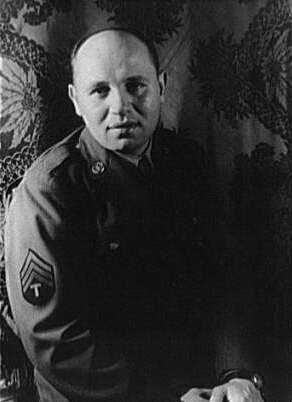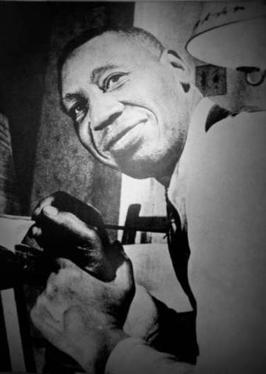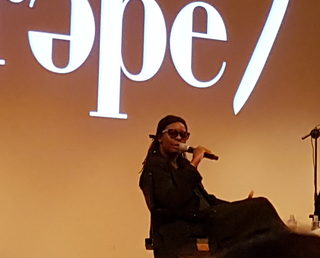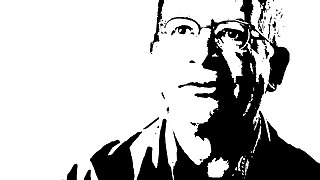Related Research Articles

Charles Henry Alston was an American painter, sculptor, illustrator, muralist and teacher who lived and worked in the New York City neighborhood of Harlem. Alston was active in the Harlem Renaissance; Alston was the first African-American supervisor for the Works Progress Administration's Federal Art Project. Alston designed and painted murals at the Harlem Hospital and the Golden State Mutual Life Insurance Building. In 1990, Alston's bust of Martin Luther King Jr. became the first image of an African American displayed at the White House.

Jacob Armstead Lawrence was an American painter known for his portrayal of African-American historical subjects and contemporary life. Lawrence referred to his style as "dynamic cubism", an art form popularized in Europe which drew great inspiration from West African and Meso-American art. For his compositions, Lawrence found inspiration in everyday life in Harlem. He brought the African-American experience to life using blacks and browns juxtaposed with vivid colors. He also taught and spent 16 years as a professor at the University of Washington.

Romare Bearden was an American artist, author, and songwriter. He worked with many types of media including cartoons, oils, and collages. Born in Charlotte, North Carolina, Bearden grew up in New York City and Pittsburgh, Pennsylvania, and graduated from New York University in 1935.

Horace Pippin was an American painter who painted a range of themes, including scenes inspired by his service in World War I, landscapes, portraits, and biblical subjects. Some of his best-known works address the U.S.'s history of slavery and racial segregation. He was the first Black artist to be the subject of a monograph, Selden Rodman's Horace Pippin, A Negro Painter in America (1947), and The New York Times eulogized him as the "most important Negro painter" in American history. He is buried at Chestnut Grove Cemetery Annex in West Goshen Township, Pennsylvania. A Pennsylvania State historical Marker at 327 Gay Street, West Chester, Pennsylvania, identifies his home at the time of his death and commemorates his accomplishments.

African-American art is known as a broad term describing visual art created by African Americans. The range of art they have created, and are continuing to create, over more than two centuries is as varied as the artists themselves. Some have drawn on cultural traditions in Africa, and other parts of the world where the Black diaspora is found, for inspiration. Others have found inspiration in traditional African-American plastic art forms, including basket weaving, pottery, quilting, woodcarving and painting, all of which are sometimes classified as "handicrafts" or "folk art".

Robert Hamilton Blackburn was an African-American artist, teacher, and master printmaker.

Beverly Buchanan was an African-American artist whose works include painting, sculpture, video, and land art. Buchanan is noted for her exploration of Southern vernacular architecture through her art.

Raymond Saunders is an American artist known for his multimedia paintings which often have sociopolitical undertones, and which incorporate assemblage, drawing, collage and found text. Saunders is also recognized for his installation, sculpture, and curatorial work.

Alma Woodsey Thomas was an African-American artist and teacher who lived and worked in Washington, D.C., and is now recognized as a major American painter of the 20th century. Thomas is best known for the "exuberant", colorful, abstract paintings that she created after her retirement from a 35-year career teaching art at Washington's Shaw Junior High School.
Mary Schmidt Campbell, is an American academic and government administrator, and museum director. She was the 10th president of Spelman College, serving from 2015 to 2022. Prior to this position, she served as a director and curator for art museums, as the director of the Commission for the New York City Department of Cultural Affairs, and for many years as the Dean of the Tisch School of the Arts at New York University.

Mickalene Thomas is a contemporary African-American visual artist best known as a painter of complex works using rhinestones, acrylic, and enamel. Thomas's collage work is inspired from popular art histories and movements, including Impressionism, Cubism, Dada, the Harlem Renaissance, and selected works by the Afro-British painter Chris Ofili. Her work draws from Western art history, pop art, and visual culture to examine ideas around femininity, beauty, race, sexuality, and gender.

Norman Wilfred Lewis was an American painter, scholar, and teacher. Lewis, who was African-American and of Bermudian descent, was associated with abstract expressionism, and used representational strategies to focus on black urban life and his community's struggles.
Betty Blayton was an American activist, advocate, artist, arts administrator and educator, and lecturer. As an artist, Blayton was an illustrator, painter, printmaker, and sculptor. She is best known for her works often described as "spiritual abstractions". Blayton was a founding member of the Studio Museum in Harlem and board secretary, co-founder and executive director of Harlem Children's Art Carnival (CAC), and a co-founder of Harlem Textile Works. She was also an advisor, consultant and board member to a variety of other arts and community-based service organizations and programs. Her abstract methods created a space for the viewer to insert themselves into the piece, allowing for self reflection, a central aspect of Blayton's work.

Spiral was a collective of African-American artists initially formed by Romare Bearden, Charles Alston, Norman Lewis, and Hale Woodruff on July 5, 1963. It has since become the name of an exhibition, Spiral: Perspectives on an African-American Art Collective.
Arnold J. Kemp is an American artist who works in painting, print, sculpture, and poetry. After graduating from Boston Latin School, Kemp received a BA/BFA from Tufts University and the School of the Museum of Fine Arts Boston, and an MFA from Stanford University.
Joe Wesley Overstreet was an African-American painter from Mississippi who lived and worked in New York City for most of his career. In the 1950s and early 1960s he was associated with the Abstract Expressionist movement.
Louis Fratino is an American visual artist.
Anthony Cudahy is an American painter. Cudahy's approach is both figurative and abstract and takes inspiration from a breadth of source material ranging from personal photographs, movie stills, queer archival images and ephemera, and art history. Cudahy lives and works in Brooklyn, New York.

Frank Stewart is an African-American photographer based in New York. He is best known for photographing prominent Jazz musicians.

Reginald Gammon was an American artist and member of the African-American artist's collective, Spiral.
References
- 1 2 Dambrot, Shana Nys (2018-06-06). "Gay Black Artist Jonathan Lyndon Chase Makes His Mark in the L.A. Art World". L.A. Weekly . Retrieved 2018-10-20.
- ↑ "Jonathan Lyndon Chase · Company Gallery". Company Gallery. Retrieved 2018-10-20.
- ↑ "With Back-To-Back Sold-Out Shows, the 28-Year-Old Painter Jonathan Lyndon Chase Is a Young Artist to Watch". artnet News. 2018-06-29. Retrieved 2018-10-20.
- ↑ "Chase". Kohn Gallery. Archived from the original on June 7, 2018. Retrieved 2018-10-20.
- 1 2 3 "28-year old, Philadelphia-based artist Jonathan Lyndon Chase is everywhere this past year". Whitehot Magazine of Contemporary Art . May 2018. Retrieved 2018-10-20.
- 1 2 3 "Jonathan Lyndon Chase". The Fabric Workshop and Museum. Retrieved 2025-01-15.
- ↑ "Jonathan Lyndon Chase: Sheets". The Brooklyn Rail. 11 July 2018. Retrieved 2018-10-20.
- ↑ "Quiet Storm · Company Gallery". Company Gallery. Retrieved 2018-10-20.
- ↑ Cotter, Holland (26 April 2018). "10 Galleries to Visit Now on the Lower East Side". The New York Times. Retrieved 2018-10-20.